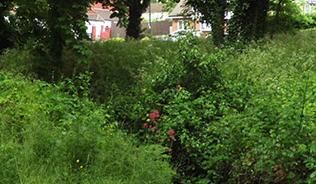In support of this year’s World Environment Day campaign, #BeatPlasticPollution, the IES ran a series of events in Bristol, London and Edinburgh showing the award-winning documentary, A Plastic Ocean. Each screening was followed by a panel debate exploring the scientific evidence behind this environmental issue and some of the potential unintended environmental impacts many proposed plastic alternatives and solutions could present. In this blog, our Events Officer, Rhianna Jarvis, reflects on some of the key themes that emerged from these discussions and how we can move from despair to positive action.
Having been a diver for several years I have been extremely lucky to have had some amazing encounters with some of the world’s most beautiful marine life. However, during this time I have also unfortunately experienced first-hand the devastating and far-reaching impact our misuse of plastic is having on the marine environment. Untangling fishing gear from coral reefs and seeing more plastic than fish on some dives is sadly not as unusual as you’d hope it to be. I was delighted when the IES decided to support World Environment Day this year by launching a series of marine focused events to raise awareness of this issue.
Plastic pollution has been one of the most widely reported environmental issues of 2018. Substantial evidence has been gathered and progress has already been made towards addressing this problem, however, the need for interdisciplinary collaboration between academia, industry and scientists is imperative for further progress. It was fascinating to see the different themes emerge from each panel debate after watching the documentary and to discuss the roles that citizens, industry, scientists and governments can play in tackling this issue.
Bristol – The impact of the individual
It is easy to feel oppressed and overwhelmed by the scale of the problem after watching A Plastic Ocean, as several graphic scenes reiterate the devastating impact plastic is having on the marine environment. Our first screening welcomed expert panellists Natalie Fee, (Founder of City to Sea), Susan Jay (Circular Economy Technical Specialist at WRAP Cymru), Jo Ruxton (Co-Founder of Plastic Oceans Foundation) and Stacey Fordham (Co-Founder of Zero Green). This panel put forward multiple suggestions to reduce our consumption of single-use plastic, empowering consumers to make simple switches to bamboo toothbrushes and long-life water bottles and to refuse plastic straws. The discussion focused on the need to move away from a linear use of plastic and develop an efficient circular economy which incorporates effective recycling through innovative new systems and revolutionary management approaches. Recycling alone should not be seen as the solution to address our misuse of plastic, as continued recycling reduces the robustness of materials and has costly implications for the industry and the environment. Raising public awareness and the use of education to encourage consumers to develop more eco-friendly behaviours is needed. If you can’t reuse it, refuse it.
London – Closing the Circle
With plastic now being discovered in Arctic Sea ice, the Mariana trench and in all marine environments worldwide it is important to recognise this as a global issue and put pressure on the manufacturing industry internationally to address the production of non-recyclable packaging. Biodegradable polymers in combination with improved recycling are frequently proposed alternatives. However, without sufficient investment to develop the infrastructure these biodegradable alternatives require to break down, they will be diverted to landfill, or worse, continue to enter the marine environment. These materials require anaerobic digestion conditions in order to break down, conditions which are not present in the marine environment. Without effective management these materials will continue to contribute to the problem and will remain in the marine environment as litter providing false hope that these bioplastics could provide a solution to the issue. Our panellists at this event, Doug Allan (wildlife cameraman and part of the film crew for A Plastic Ocean), Edward Kosior (Managing Director at Nextek Ltd), Peter Kershaw (Independent Marine Scientist) and Sonja Eisfield-Pierantonio (Policy Officer at WDC, Whale and Dolphin Conservation), went on to discuss barriers to progression. The UK is a world leader in scientific and technological research and innovation in this area, but experts currently feel political will is lacking to deliver large-scale systemic change. Due to increased costs in manufacturing 100% recyclable plastic, supermarkets and manufacturers are reluctant to make this change, presenting the need for new legislation to be developed which can close the cycle and ensure this extra cost is not placed on the consumer.
Edinburgh – The role of science
Although industry experts, government, scientists and the public increasingly recognise the problems posed by marine plastic pollution, considerable knowledge gaps hider our ability to make progress on this issue. For our final screening, we were joined by Professor Colin Moffat (Chief Scientific Adviser Marine at Marine Scotland), Dr Phillip Cowie (Independent Marine Consultant), Sarah Archer (Senior Projects Manager at Fidra) and Catherine Gemmell (Scotland Conservation Officer at the Marine Conservation Society). The discussion at this session focused heavily on the need for continued scientific research and evidence from both field and laboratory studies. The ability to isolate the causes and consequential impacts of plastic on the environment is imperative if scientists are to effectively make the case for stronger legislation and policy in this area. All panellists emphasised the vital role citizen science can play. By taking part in beach cleans or nurdle hunts and sending findings to various organisations like Fidra and the Marine Conservation Society, the public can assist experts in building more accurate maps of affected areas, and contribute to developing the evidence base required to inform policy change. Irrespective of where you live or the location at which debris accumulates in the marine environment, due to the interconnectivity of the world’s oceans and transportation of plastic by marine currents, winds, rivers and drifts, our actions have a global impact. Regardless of the condition of our immediate waterways, we are all responsible for stopping our waste from entering the water system and contributing to the global issue.
Time for a new approach
Despite single-use plastic’s negative impact on the natural environment due to our inability to control our dependence on it, it is important we recognise the value of this commodity. Without plastic we would not have achieved many of the technological and medical advances made over the last century. In many ways, the use of plastic has had a positive impact on our societies and the environment. Its use in vehicle manufacturing has resulted in lighter vehicles consuming less fuel and therefore, reducing carbon emissions. Our use of single-use plastics to aid our convenient disposable lifestyle is where plastic has been mistreated. We need to rethink our use of single-use plastic and through systemic change from business, government, industry and individuals reconsider the environmental impact of our lifestyle. By ignoring this and focusing on the development of clean-up solutions rather than addressing the cause of the problem, we are accepting that the next generation will be burdened with the duty to clean up our mess, passing this responsibility down through generations to come.





